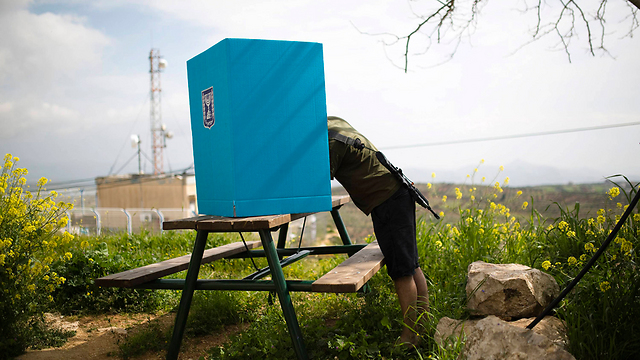
Israel's lurch to the right
Opinion: The political bloc that built the country and held the reins of power for decades is now decimated by the country's shift in political proclivity; but politicians would do well to understand that the shift could easily reverse itself too
The political polls conducted ahead of the April 9, while not predicting who will win and who will lose, do point to a clear and significant trend in Israeli society, which somehow has escaped the notice of many - a rightwards shift by the Israeli middle class.
The middle class has been the greatest beneficiary of the economic boom of the past decade, and is the backbone of the right-wing – both moderate and not so moderate.
In contrast to Western countries, where the middle class has been eroded and weakened, in Israel it strengthened and stabilized. Its members are interested in the continuation of existing policy in areas related to their personal lives as well as to security and political stability. To them, Netanyahu is the best candidate to meet their needs.
The Likud alliance was perceived in its early years as "an alliance of the underprivileged." In recent years, however, it has become an alliance of the establishment.
They do feel unease about the indictments against Netanyahu and the frequent revelations of corruption, but when they get to the ballot box, they hold their noses and vote against change. The urge to keep things exactly as they are is too strong.
Therefore, the division into right-wing and center-left blocs shown in the surveys is entirely arbitrary, and disregards the way in which the parties define themselves. In previous elections, Yair Lapid rejected that his Yesh Atid party (now folded into Blue and White) was naturally allied with Labor, Meretz and the left-wing parties, in a bloc branded as center-left, and rightly renounced such a definition of his movement.
Of course, this branding does not apply to Blue and White, whose list is headed by three former chiefs of staff who are not affiliated with the political left. If anything, Blue and White is an integral part of the right-center bloc.
This is a huge bloc that includes the Likud, Kulanu, the ultra-Orthodox parties, Yisrael Beiteinu and the New Right. It is a bloc that will likely command 85 seats in the next Knesset. If Yisrael Katz or Gideon Sa'ar had been leading such a bloc, it would have been the next government.
The late Ariel Sharon led Kadima - which split to the left from the Likud - on the basis of the assumption that "the occupation is bad for Israel" and must be ended. In his appearance before the United Nations General Assembly, he made an exhilarating speech about peace being the aspiration of his life.
The current center-right bloc has replaced the effort to end the occupation, in other words replacing any attempt to create a sovereign, contiguous and viable Palestinian state with the phrase "separation."
Separation means limited Palestinian civil administration over parts of the West Bank, exclusive Israeli military control over most of the territory, and annexation of between 8 to 80% of it, depending on the combination of messianism and practicality in the government.
The parties in the center-right bloc do not even espouse a social-economic socio-democratic worldview: They have replaced the idea of a welfare state with the idea of a "compassionate" state - a key concept in the socio-economic platforms of the Republicans in the United States and the Conservatives in Britain.
The left-center bloc, on the other hand, includes only the Labor Party and Meretz. According to the polls, they will have 15-17 seats in the next Knesset. This is what remains of the Zionist Labor Movement, which created the State of Israel. On the periphery are the extreme right, identity parties, Otzma Yehudit (Jewish Power), and the extremist Arab parties.
The decline of the left-center bloc took place in a short period of time and cannot be blamed on any one factor – political transformations occur due to an inexplicable combination of triggers and factors.
These transformations can surprise us with key moments of change, such as the resurgence of nationalism and populism in the 21st century. But if the wind can suddenly shift rightwards one day, it is equally able to swing to the left shortly afterwards.












